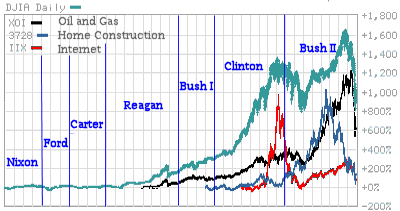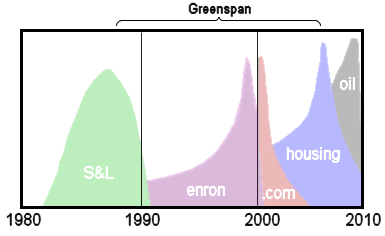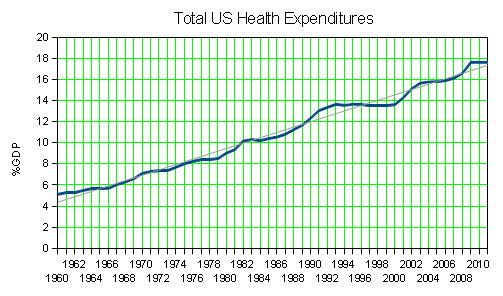Your post brings up the interesting question of whether there is a “healthcare bubble” in the U.S., and if so, when it’ll pop.


Psycritic stepped into it with his question, because I was actively musing about whether there was a medical/pharmacological bubble when Senator Grassley began his investigation in 2008-2009. But when I started looking, I got pulled into the vortex of the corruption in the academic-pharmaceutical alliance in my specialty of psychiatry and never got out. But the term, Irrational Exuberance, sure fit when it came to the antidepressants and atypical antipsychotics – the blockbuster era in psychopharmacology.
So here’s the question back on the table. I have no doubt that Healthcare in the US is a falsely inflated market, no doubt at all. I would be surprised if anyone doubts that. But it doesn’t look like a bubble graph. It’s a long slow climb – a relentless progression …

… rather than the steep rise like we expect in a financial bubble – a boom. And it has been going on for a very long time. In fact, it has been going on about as long as there has been a Healthcare Industry. I’m not even sure I can define what I mean by the Healthcare Industry or know enough to say when it even started, but I have the feeling everyone knows what I’m talking about. It came in pieces. Health Insurance after World War II. FDA regulations and drug approval in the 1960s. Then hospital corporations, and managed care, and pharmaceutical giants, and Medicare, and Medicaid, and … It just happened along with the corporatization of everything else until it became the Healthcare Industry and that’s how we talked about it. And along with that, there were the Healthcare Market[s].
This falsely inflated market doesn’t have the steep lead-in of a financial bubble, and that graph up there just keeps on rising and taking a bigger and bigger piece of the pie. And back to Psycritic’s question, it doesn’t burst or pop like financial bubbles. It seems to grow unaffected by those usual market forces economists so love to talk about. What do you call a market like that – a falsely inflated market that is unopposed by any apparent forces to hold it in bounds? I personally think it’s called a Monopoly, and I don’t think we’ll be able to do anything about it until we come to grips with what that means. I wish it were a financial bubble, but it’s not. The medical analogy for an economic Monopoly is cancer – something that grows without restraint until it destroys its host. That’s a real possibility with the Healthcare Industry.
http://www.alltrials.net/2013/should-we-banish-the-term-negative-trials/
Mickey, thanks for the lesson on financial bubbles. I agree that healthcare expenditure in the U.S. does not behave like a bubble, but I’m not sure if “monopoly” is the right term for the healthcare industry. After all, a single-payer system like what many developed countries have is a government monopoly (or monopsony) on the provision of healthcare, and it seems that those systems are better able to control costs than our own.
The issue in the U.S. seems to me to be all the profit-taking that the oligopolies of insurance companies, pharmaceutical companies, hospitals (on a local level there may only be a few choices available to an individual), etc. extract from taxpayers, who are shielded from the true cost of things. I’ve thought for a long time that if we went entirely socialist or entirely libertarian with healthcare, both ways would work to stop the ever-rising expenditures, but we exist in this weird in-between state that allows costs to keep going up.
It’s late, and I may be rambling and not making much sense. But I’d be curious to hear what you think.
I am probably being a bit on the paranoid side, but I have to think that a large contributor to the slow and relentless rise is (over-)medication leading to iatrogenic illness leading to more medication. There are, of course, social factors that lead to a nearly fetishized belief in drugs, but these factors, plus the multiple effects of drugs, lead more and more drugs. Thus more and more money for health without more health.
Psycritic,
I know it’s not a monopoly proper, but the economics are monopoly-like. I’m not sure that a real monopoly wouldn’t be better. But I can’t think of a better term to describe a market that doesn’t have built-in forces of restraint and containment. That’s the part I want to think about too. And your point about picking one unity or another instead of the mixed bag we have is intriguing. And I’m thinking that economics is as soft a science as the one we work in, on the one hand, on the other hand.
A number of good points are being made, especially about shareholder value. We are seeing this mantra consume companies so that many companies are being sold, or broken up, resulting in the loss of an ongoing concern for a one time payout.
The relationship to medicine is that there is an effort to “get mine” with no concern for the ongoing need for medical care in this country. The concept of cancer destroying the host is apt given that I feel the only way to stop the growth is for government regulations that will effectively curb our current system of unlimited medical care.
Economics is a soft science and much like drug trials the first question is; how do you want this to end? In economics you are suppose to be looking three and four steps out from the problem, but this rarely occurs in today’s world.
With a corporate world focused on quarterly reports, and a doctor focused on 90 day office visits, it is hard to gat anyone to take the long view.
Steve Lucas
http://economistsview.typepad.com/economistsview/2013/09/rage-of-the-privileged.html
I don’t believe US healthcare is in a bubble because bubbles are driven by misguided demand that may go elsewhere if it chooses — as we have seen in our investment bubbles.
The ever-ascending curve of US healthcare costs is symptomatic of cartel activity when demand is inelastic. Consumers can’t go elsewhere other than the cartel — an alliance of insurance companies, hospitals, pharma, etc. — to get healthcare. Pricing is opaque, they can’t comparison shop in any meaningful way.
When demand is inelastic, cartels may raise prices to the level the market will bear. This is what we’ve seen — an inexorable rise in prices and profits. Aside from nationalization, regulation is the only way to contain the cartel, but it protects itself by lobbying government and staying just under the line of price increases that would cause widespread outrage.
This is why we saw a plateau in the Clinton years — the cartel knew it was under scrutiny and slowed its price-raising.
The energy industry also preys on inelastic demand, but the cartel is international and prone to fracturing due to politics. Locally, the energy cartel raises prices as much as the market will bear; some localities have much more expensive gas than others.
There are four monopolies combined that bring us to this juncture. The most powerful being the field of psychiatry with its power to legally determine who is “mentally ill , what form(s ) that illness takes, and what should or must be done about it. Psychiatry has been given the power to deprive people of their freedom and to invade lives to the degree that they can legally force persons to be medicated for life on the basis of a psychiatrist’s opinion; which is informed by an hypothesis that is marketed as medical science. That is a lot of power being wielded by persons by fiat. Combined with the powers of the drug industry and marketing it has taken us into such a place that intelligent, educated, and thoughtful persons now believe that one out of four people on this planet has a mental illness that is genetically determined and can be overcome with psychoactive drugs. The drug companies as savior meme is just as toxic as the cocktails people are being prescribed.
Psychiatry, the drug industry, marketing, and the law— the whole structure needs to broken down. I recommend that direct to consumer marketing of drugs be outlawed, and that doctors be required to learn the differences between science and marketing. I also recommend that our legal system be required to start analyzing it’s relationship with psychiatry and other aspects of our “mental health” industry and its misconceptions about what is and is not evidenced based in the field of psychiatry and in the courts.
Finally, what I think that the old-psychiatry has to offer is that psychiatrists be required to confront themselves up close and personal. The class divide between doctors and low income patients is so huge that I believe that too many psychiatrists are blinded by their own sense of entitlement and prejudice. People lower on the “mental health” totem pole appear to me to be telling tortured people to behave as if they were middle-classed and to comply with the doctors orders, often to detriment of the patient.
As you’ve said many times, Mickey— strong>humility. It is needed because its absence distorts the thinking of people who have been given the power to judge others’ minds and to infringe upon those minds for personal gain and unchecked monetary gain. Getting knocked off its high horse would be the best thing that could happen to this amok running field.
Dang it!
Humility
— can’t be stressed too much.
A truly shocking expose of the pharmaceutical companies influence on Congress from 60 Minutes. How it openly buys votes. It is from 2008.
How the Medicare Drug bill was bought by Big Pharma lobbyists from corrupt politicians to cost billions more that were hidden until after the very late night vote after much arm twisting. Many of the arm twisters in Congress who pushed through this latest Big Pharma/corporate welfare went on to get lucrative lobbying jobs with Big Pharma with many in negotiation while pushing through this vile bill. Perhaps experts’ claims that psychopathy is on the rise has something to do with the huge extra profits for corporations like Big Pharma while health care costs and inequality continue to grow exponentially. One has to have a strong stomach and good anger management skills to get through this sordid video with much shameless psychopathic behavior exposed. Why isn’t such grand larceny illegal?
http://psychiatricnews.wordpress.com/2013/01/20/big-pharma-in-action/
Pharma marketing is a topic often covered on Health Care Renewal. This recent link may be of interest:
http://hcrenewal.blogspot.com/2013/09/vested-interests-and-their-influence-on.html
Steve Lucas